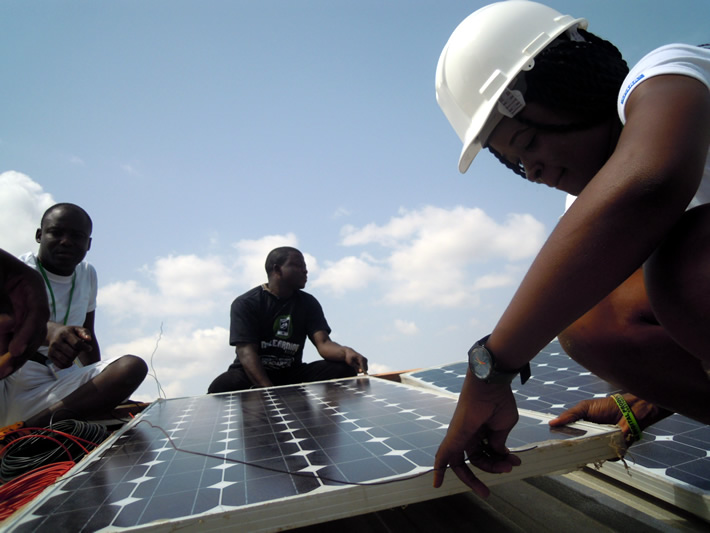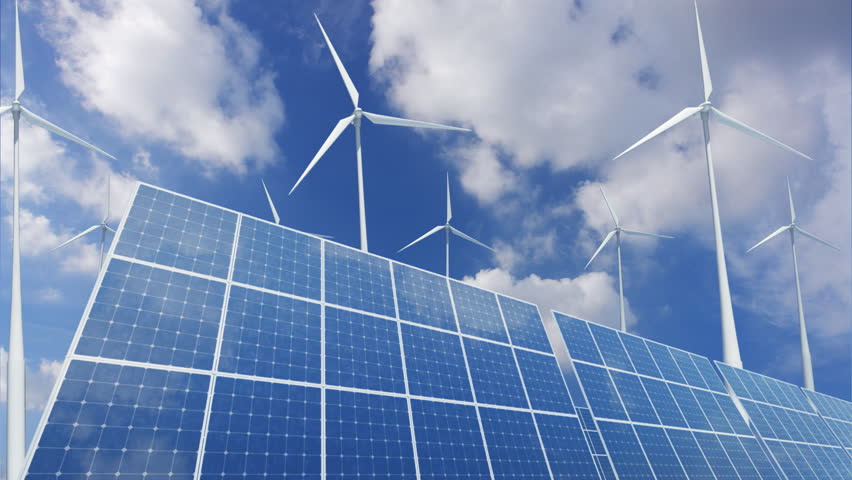In emerging economies where jobs and access to power are often linked in an unfortunate downward spiral, there is also a growing realisation of the potential boost that off-grid renewable power can offer small and medium sized businesses. There are truly Nigerian business models that can use renewable energy to create really substantial numbers of jobs throughout the country.
|
International Renewable Energy Association, IRENA: Renewable Energy Jobs Worldwide: 2004: 1.3 m 2010: 3.5 m 2014: 7.7 m 2030: 20 m |
The huge global rise in jobs relating to renewable energies shows the two sectors where Nigeria can grow jobs in the hundreds of thousands. Firstly, there are jobs in the generation sector, in endeavors such as solar panel production, mini grid installations of solar, gas or wind grids for communities or industrial clusters and in the maintenance of these. Secondly, the indirect job creation resulting from providing electricity to millions of SMEs and other productive businesses and industries.
The Nigerian Economic Summit Group, working with the Job Creation Unit under the Vice Presidency has calculated that over 500,000 direct jobs – not counting the indirect jobs – could be created by supplying off-grid energy in the agricultural, retail and IT sectors.
For example, talk of Pay As You Go (PAYG) Solar which may be deployed for small, medium and micro scale businesses. The typical Nigerian barber shops, hairdressing salons, cyber cafes, dry cleaners etc. readily come to mind. Setting up these businesses with steady affordable and reliable PAYG Solar can trigger increased profits through costs savings of as much as 87%. With such viability and lucrativeness, 1,000 PAYG installations per Nigerian state is a solid possibility. And with every 200 SMEs connected, about 1 MW is added to Nigeria’s power pool – without being linked to the failing national grid.
Reasonably, a team of about 3 PAYG installers can work at a rate of about 10 solar installations per month. This creates jobs for about 30 installers/technicians, with a possibility of an additional 2 or so jobs for each of these small business owing to associated business growth accruing from reliable power. Indeed, by very modest estimates, at least 2,030 direct jobs can be created in each state within 3 to 6 months. This is also not minding the number of indirect jobs that would very likely result from mere access to increased lighting; growth of existing business and/or creation of new businesses within such localities. Rolling out this in all states of the federation would mean well over 70,000 jobs in the country[1]. And this is only from PAYG Solar!
Solar Mini Grids, particularly for rural areas, are another example. Although sunshine hours vary across Nigeria, there are reasonable potentials for this all around the country – even in southern states with lower sunshine hours/intensity. If just one mini grid system is considered in each state (of which there are several rural community clusters per state lacking access to electricity), there is a potential for creating at least 25,500 direct jobs across the entire federation. For each state, this will result from one-off jobs including site preparation, construction and installation, to permanent jobs created for O&M workers at solar farms, employees of new SMEs triggered per community accessed (as direct offtakers energy from the mini grids), amongst many other indirect job creation channels triggered along the value chain of these SMEs and the solar solution providers themselves.
Lots of job creation potentials also exist from roof top solar systems in urban centres, RE-powered irrigation systems, biomass powered farm gate clusters and even RE-powered milk collection centres in northern Nigeria where lack of access to refrigeration is limiting the number of businesses and job creation ventures (such as yoghurt, ice cream, cheese, butter businesses) that can grow in this milk-rich region.
Indeed, the potentials for creating jobs in Nigeria from RE can be really huge.
Links/Documents:
IRENA (2015): www.irena.org/DocumentDownloads/Publications/IRENA_RE_Jobs_Annual_Review_2015.pdf
IRENA (2012): www.irena.org/DocumentDownloads/Publications/RenewableEnergyJobs.pdf
__________________________________________
[1] All estimates presented in this article are based on proven and tested calculations done by professionals RE field who understand the Nigerian RE business environment and market. Many of these estimates were arrived at through projects that have already being implemented at smaller scales or that have been successfully piloted and are ready to roll out.




